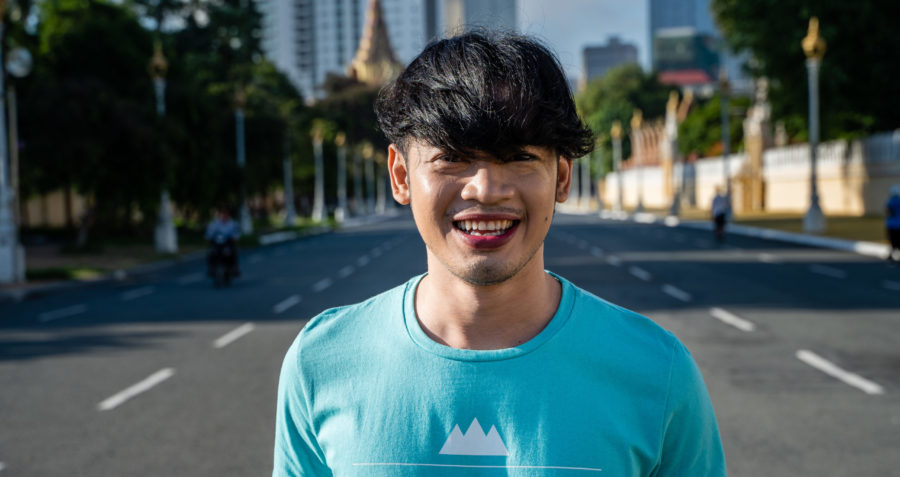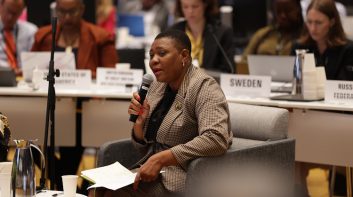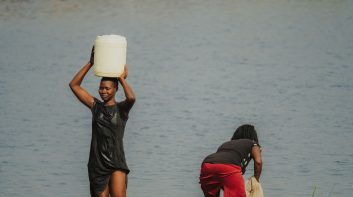The importance of Pride in preventing HIV
 © Frontline AIDS/George Jeffries/2021
© Frontline AIDS/George Jeffries/2021
Ret Sovann Punleu, 29, has been a gay man since he was 12 years old. Today, he is an outreach worker for a non-governmental organisation called Men’s Health Cambodia, which works on HIV prevention programmes for gay men and other men who have sex with men, and transgender women across the country.
Cambodia has one of the highest HIV prevalence rates in Asia. Across the country, 73,000 people are living with HIV – a problem that is exacerbated by high levels of discrimination and stigmatisation towards the LGBT+ community.
As Ret explains, stigma, discrimination and criminalisation of the LGBT+ community can result in high-risk behaviour that can lead to a greater risk of contracting HIV, because people are afraid to be open about their identity, hiding it from family, friends and their community. This fear can prevent them accessing services such as getting tested for HIV and other sexually transmitted diseases, – or to access HIV protection, including condoms.
Here Ret shares how he was motivated to become an LGBT+ activist.
In Ret’s own words
I have been gay since I was 12 years old. In Cambodia, LGBT+ people face many issues. The first one is stigmatisation by their friends and family and society as a whole. This can create problems with people not getting tested for HIV or not receiving treatment if they are HIV positive.
Also, there are not equal opportunities for members of the LGBT+ community, especially when it comes to employment. There’s a lack of education among employers and opportunities for members of the LGBT+ community to get appropriate training for the roles. It’s also very difficult for people to get acceptance from their family.
I was motivated to become an activist because I want Cambodian society to safely control the spread of HIV and I want to stop the stigmatisation of LGBT+ people. I want LGBT+ people to have equal rights.
Understanding the risks of HIV
A big issue for LGBT+ people is getting the right information. Because people hide their identity, it means that they don’t get access to proper services that provide them with the correct information. People who don’t have access to this information are unsure about their HIV status and this can lead to them unknowingly infecting their partner and other people. People can feel isolated and that no one is taking care of them. This can lead to social exclusion.
I work to support my LGBT+ community members by educating them about the risks of HIV – providing the community with counselling, referring people for HIV testing and providing them with ongoing counselling if they are found to be living with HIV. We also refer people to mental health services if they need them and provide education about drinking alcohol, as getting drunk can lead to people engaging in high-risk behaviours.
I’ve learnt a lot about HIV and sexual and reproductive health since I’ve started working at Men’s Health. This is great because I can now share my knowledge with my community. I also advocate for the LGBT+ community to find out about their HIV status. If people are living with HIV, I make sure that they sign up for antiretroviral therapy (ART) and follow up with them to make sure that they follow the treatment. With modern ARTs, people can live normal lives. I see this as being a successful contribution to the community with the work that I do at Men’s Health.
The challenges for LGBT+ activists
Working as an LGBT+ activist has its challenges. Sometimes it can be difficult to engage with the community. Sometimes people don’t attend the sessions because the community might find out about their identity.
My friends often tell me not to think too much about gender identity. We just have to enjoy what we want to do and what we want to have. The thing that makes me proud to be a member of the our community is that I have my network and the organisation that I work for always supports me. Also, my friends and family don’t stigmatise me for being gay.
Being proud
Pride to me means freedom of expression, enjoyment with the LGBT+ community and proudly showing my identity as a gay man to the outside world. It’s also a great opportunity to mobilise support from the community.
One thing I don’t like about LGBT+ rights in Cambodia is that same-sex marriage is not recognised by Cambodian law. I don’t feel like this follows human rights, because LGBT+ rights are human rights.
If I could change the world’s attitude towards LGBT+ people, I’d like to see equal rights for the LGBT+ community. It would be good to see the LGBT+ community have the same human rights as other people. I’d also like to see the legalisation of same-sex marriage so that couples can exist in the community with the same rights as everyone else.
LGBT+ rights in Cambodia
In the future, I’d like to see four main things:
- Family and friends and society as a whole understand and accept LGBT+ rights.
- LGBT+ people take on leadership roles in their jobs. If we can see LGBT+ people becoming CEOs of companies and famous LGBT+ people in Cambodia, they will act as good role models and inspiration for the rest of the community.
- More dialogue between LGBT+ people and society as a whole, to help improve understanding of LGBT+ people and the role they play in society.
- Equal employment opportunities for LGBT+ people.
There are many famous LGBT+ people in Cambodia, but they still keep their identity hidden. I would like to see more famous people coming out and showing their identity to the world – not only famous people but businesspeople and everyone across society. I want all LGBT+ people to feel that they can openly talk about their identity so that they can act as role models for the rest of the community.
Further Reading
Tags
CambodiaHIV preventionHuman rightsLGBT




